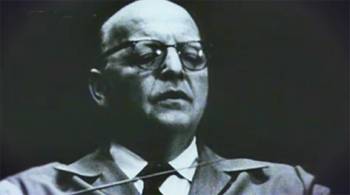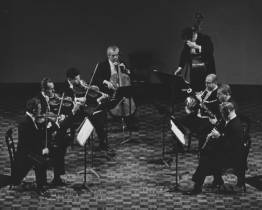
Josef Alois Krips (8 April 1902 – 13 October 1974) Krips was born in Vienna, and went on to become a pupil of Eusebius Mandyczewski and Felix Weingartner. From 1921 to 1924, he served as Weingartner's assistant at the Vienna Volksoper, and also as répétiteur and chorus master. He then conducted several orchestras, including in Karlsruhe from 1926 to 1933. In 1933 he returned to Vienna as a resident conductor of the Volksoper and a regular conductor at the Wiener Staatsoper. He was appointed professor at the Vienna Academy of Fine Arts in 1935, and conducted regularly at the Salzburg Festival between 1935 and 1938. In 1938, the Nazi annexation of Austria (or Anschluss) forced Krips to leave the country. (He was raised a Roman Catholic, but would have been excluded from musical activity because his father was born Jewish.) Krips moved to Belgrade, where he worked for a year with the Belgrade Opera and Philharmonic, until Yugoslavia also became involved in World War II. For the rest of the war, he worked in a food factory. On his return to Austria at the end of the war in 1945 Krips was one of the few conductors allowed to perform, since he had not worked under the Nazi régime. He was the first to conduct the Vienna Philharmonic and the Salzburg Festival in the postwar period. From 1950 to 1954, Krips was principal conductor of the London Symphony Orchestra. Afterwards, he led the Buffalo Philharmonic Orchestra and (from 1963 to 1970) the San Francisco Symphony. He made his Covent Garden debut in 1947 and his Metropolitan Opera in 1966, guest conducting frequently from then on. In 1970, he became conductor of the Deutsche Oper in Berlin. Between 1970 and 1973, he was the principal conductor of the Vienna Symphony. He died at 72 in Geneva, Switzerland in 1974. 
The Berlin Philharmonic Octet was founded more than 70 years ago and was the first chamber association of the Berliner Philharmoniker to appear in all major European cities. Since then the ensemble has continually renewed itself, drawing again and again from the Berliner Philharmoniker’s membership: its chronicle features such great names and world-famous musicians as the former concertmasters Spivakovsky, Rohn and Borries; the cellists Piatigorsky, Graudan and de Machula; the clarinettist Bürkner and the bassoonist Rothensteiner. After World War II, the ensemble expanded its already vigorous touring activities within Europe to take in other continents, visiting the USA, Canada, Africa, Japan, Korea, China, Malaysia, New Zealand and Australia. In 1978 the Philharmonic Octet gave its first concerts in Israel and the Soviet Union. It has appeared regularly at the festivals of Salzburg, Lucerne, Edinburgh and Berlin. Paul Hindemith dedicated his Octet to the ensemble in 1958 and played first viola when they gave the premiere in Berlin. Other composers who have written for them include Hans Werner Henze, Boris Blacher, Werner Thärichen, Karl Heinz Wahren, Karlheinz Stockhausen and Isang Yun. *********************************** Ludwig van Beethoven Septet in E-flat major, Op. 20 Philharmonic Octet Berlin 1958 (Live in Edinburgh Festival) Ludwig van Beethoven Symphony No. 5 in C minor, Op. 67 Los Angeles Philharmonic Orchestra Josef Krips 07.07.1970 (live) *********************************** | 
